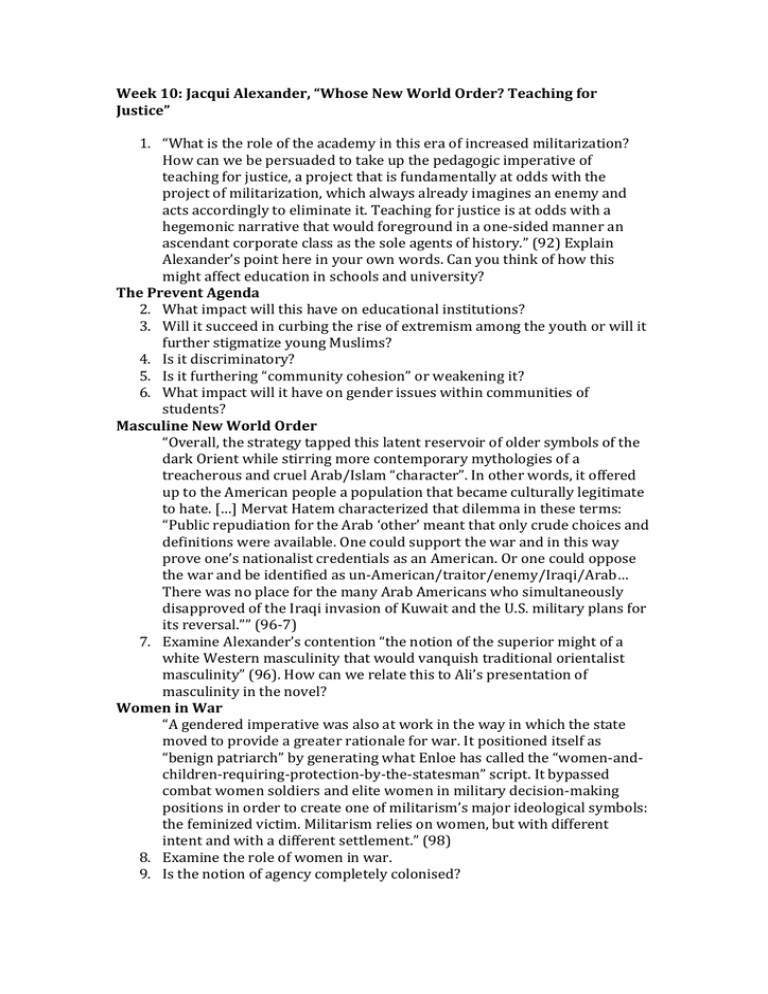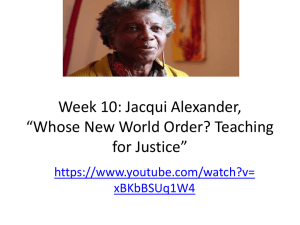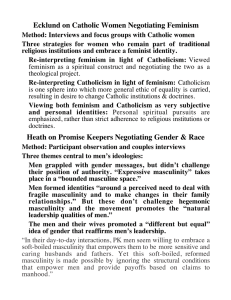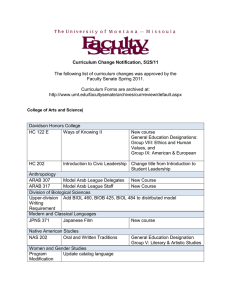Week 10: Jacqui Alexander, “Whose New World Order? Teaching for Justice”
advertisement

Week 10: Jacqui Alexander, “Whose New World Order? Teaching for Justice” 1. “What is the role of the academy in this era of increased militarization? How can we be persuaded to take up the pedagogic imperative of teaching for justice, a project that is fundamentally at odds with the project of militarization, which always already imagines an enemy and acts accordingly to eliminate it. Teaching for justice is at odds with a hegemonic narrative that would foreground in a one-sided manner an ascendant corporate class as the sole agents of history.” (92) Explain Alexander’s point here in your own words. Can you think of how this might affect education in schools and university? The Prevent Agenda 2. What impact will this have on educational institutions? 3. Will it succeed in curbing the rise of extremism among the youth or will it further stigmatize young Muslims? 4. Is it discriminatory? 5. Is it furthering “community cohesion” or weakening it? 6. What impact will it have on gender issues within communities of students? Masculine New World Order “Overall, the strategy tapped this latent reservoir of older symbols of the dark Orient while stirring more contemporary mythologies of a treacherous and cruel Arab/Islam “character”. In other words, it offered up to the American people a population that became culturally legitimate to hate. […] Mervat Hatem characterized that dilemma in these terms: “Public repudiation for the Arab ‘other’ meant that only crude choices and definitions were available. One could support the war and in this way prove one’s nationalist credentials as an American. Or one could oppose the war and be identified as un-American/traitor/enemy/Iraqi/Arab… There was no place for the many Arab Americans who simultaneously disapproved of the Iraqi invasion of Kuwait and the U.S. military plans for its reversal.”” (96-7) 7. Examine Alexander’s contention “the notion of the superior might of a white Western masculinity that would vanquish traditional orientalist masculinity” (96). How can we relate this to Ali’s presentation of masculinity in the novel? Women in War “A gendered imperative was also at work in the way in which the state moved to provide a greater rationale for war. It positioned itself as “benign patriarch” by generating what Enloe has called the “women-andchildren-requiring-protection-by-the-statesman” script. It bypassed combat women soldiers and elite women in military decision-making positions in order to create one of militarism’s major ideological symbols: the feminized victim. Militarism relies on women, but with different intent and with a different settlement.” (98) 8. Examine the role of women in war. 9. Is the notion of agency completely colonised? Feminist Education 10. “Feminism always needs vigilance around these contradictory state constructions, the cultural opposites that the state constructs as a way of maintaining hegemony.” (100) Examine whether the educated girl has been characterized as a deadly weapon in the War on Terror? 11. How can education serve a community? 12. What might a feminist education be? Women’s Work 13. “the notion of supplementary or incidental wages for women within an assumed heterosexual family both organizes and devalues women’s work.” (104) Examine the devaluation of women’s work within Ali’s novel. Desire to Know 14. “women give voice to a deeper, existential yearning: the desire to make themselves intelligible to themselves and to each another, to make domination transparent, and to practice new and different ways of being. In this process there is no opposition between the demands of survival and the needs of time. Rather, the very force of existential necessity propels the desire to know, the desire to make sense of existence. Theorizing, therefore, becomes an existential necessity.” (105-6) Could we see Nazneen as driven by the desire to know and make herself intelligible? How would you respond to Alexander’s questions? (114) 15. “Does this practice travel into the classroom and erase those same histories and the histories of immigrant women from our syllabi?” 16. “Do our analytic practices turn indispensability into victimhood, thereby reproducing the dominant script that rewrites citizenship in the names of members of the corporate class only?” 17. “How do class and privileges of different kinds operate within our own classrooms?” Speech and Voice “Teaching for justice would alert “the enemy” in the Gulf was not neatly cordoned off from sexual violence against U.S. women soldiers. Teaching for justice would have us examine the contradictions of a civilization […] Speech and voice have been intimate partners in our analytic preoccupations as feminists.” (115) 18. Examine the contradictions within Ali’s novel. 19. Examine the role of speech and voice within Ali’s novel. Colonialism and Feminism 20. “Colonialism is no stranger to feminism’s political project, either elsewhere or here. Most people’s lives, most women’s lives, have been shaped by colonialism.” (115) How has Nazneen been shaped by colonialism?




